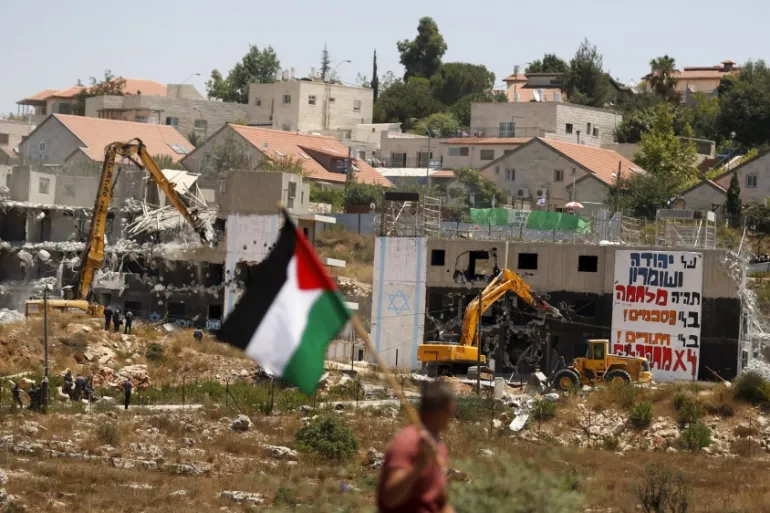77 years into the continuous Nakba, the forced mass expulsion of Palestinians from their homes, the Land Registration (“land settlement”) law aimed at establishing permanent, irreversible, and sovereign ownership of land for Israel is accelerating forced displacement in the illegally occupied West Bank. It will facilitate settlers’ control over Palestinian lands and erase Palestinian presence from their homeland.
On Sunday, May 11, Israel’s Knesset voted for taking sole responsibility for land registration in Area C, which is more than 60% of the occupied West Bank, and any Palestinian efforts to recognise land using its own land registry would not be allowed.
The Palestinian Authority (PA) created a specialized ministry to manage land mapping, documentation, and registration in Area C, using records dating back to the Ottoman and Jordanian eras. Under Israel’s new policy, Palestinian land documents will no longer be recognized in Israeli legal or administrative systems. The policy also bans PA personnel from entering Area C, effectively halting their activities.
This is an acceleration to the annexation plan, which was launched in detail in 2020, with US support. 2020 is also when Israel revived land title registration which had been suspended since the Israeli occupation began in 1967. Israel’s ultimate goal has always been colonizing all of Palestine.
Israel’s land registration = Illegal annexation and colonization of Palestinian land
Under the new policy, which is overseen by Israel’s Ministry of Defence and the Land Registration Unit of the Israeli military’s Coordination of Government Activities in the Territories (COGAT), land can now be registered in the name of Israeli citizens and settlers even more easily than before. In the past, such registration required lengthy and complex legal procedures. Settlers now merely need to place a tent or caravan on Palestinian land to file a claim, effectively turning acts of displacement into a colonial legal path to ownership.
Already in January, the Knesset’s bill “Abolishing Discrimination in Land Purchases in Judea and Samaria,” allowed settlers to purchase land within Palestinian cities and towns in the occupied West Bank, and to establish settlements outside the official regulatory framework and without direct government oversight.
Stealing Palestinian lands is even more facilitated for those occupying Palestinian land within or /near settlement outposts, particularly pastoral ones, which have expanded dramatically since October 2023. While the average number of new outposts used to be around seven per year, the past year alone saw 59 new outposts—a surge of up to 740%.
These pastoral outposts have been instrumental in the forced removal of Palestinians from their lands, leading to the displacement of over 60 Palestinian communities to date.
The Jordan Valley in the crosshairs of Israel’s annexation
The Palestinian areas currently most at risk are those located near settlement outposts in Area C, particularly in the northern Jordan Valley, the central West Bank, and southern Hebron.
In the Jordan Valley, settler militias have forcibly displaced around 18 Palestinian Bedouin communities, and established “grazing zones” for settlers to ethnically cleanse Palestinian Bedouins.
Over half of the 8,700 dunams designated for settler grazing lie within the Tubas Governorate in the northern Jordan Valley—an area that has long been a focal point of Israeli annexation efforts. Communities at particular risk include Al-Farisiya Nab’ al-Ghazal, Al-Farisiya Hamir, Al-Hadidiya, Makhoul, Samra, Ein al-Hilweh, and Wadi al-Faw.
Full scale annexation underway
The Knesset, in the presence of Energy Minister Eli Cohen, also discussed a project to connect settlements in the West Bank to the Israeli natural gas grid, which constitutes an expansion of the imposition of de facto sovereignty over Area C.
The government is also working to transfer oversight of archaeological sites in the West Bank from the Israeli military to the State Antiquities Authority, strengthening the occupation’s control over Palestinian cultural and historical resources. Israel has already begun excavations in the historic town of Sebastia in the northern West Bank, setting a dangerous precedent that paves the way for the transformation of archaeological sites into tools for justifying settlement expansion.
In parallel, the Knesset’s Constitution, Law and Justice Committee approved an amendment to adopt the term “Judea and Samaria” as the official name for the West Bank in all Israeli laws. This symbolic step carries legal implications, aiming to legitimize settlements and integrate the West Bank into the Israeli legal system.
Defend Palestinian rights
The entirety of these Israeli policies directly contradicts international law, including the 2004 and 2024 advisory opinions issued by the International Court of Justice (ICJ), which confirmed the illegality of Israel’s presence in the illegally occupied West Bank, recognized Israel’s policies of displacement as a core part of its denial of the Palestinian right to self-determination, and underlined that Israel’s policies amount to apartheid . They also outlined the legal obligations of states worldwide not to recognize, aid and assist Israel’s crimes and to ensure Israel ends them, returns the lands stolen, guarantees restitutions and reparation to Palestinians, and ensures the right of return for the Palestinians that have been displaced.
Israel must be held accountable for its genocide in Gaza and its settler-colonialism, apartheid and occupation all over Palestine.

